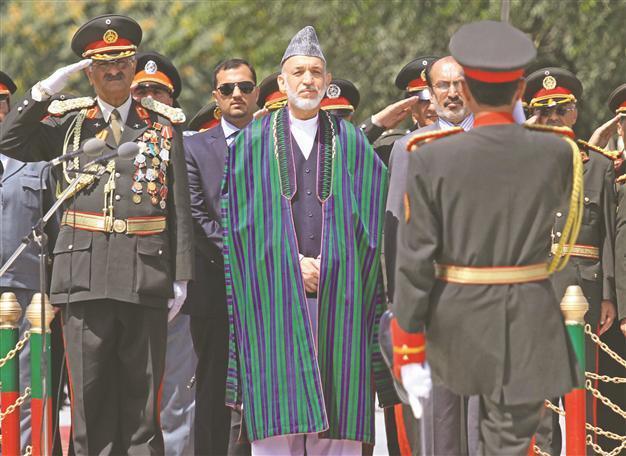Karzai solidifies power with sackings amid fresh violence
SYDNEY / KABUL

Afghan President Hamid Karzai (C) attends a ceremony at the minaret of liberty during Afghanistan’s Independence Day celebration in Kabul, Afghanistan. EPA photo
Afghan President Hamid Karzai has moved to replace the country’s intelligence chief and the ministers of defense and interior, as the first step in what senior experts said was a planned wider Cabinet shake-up aimed at solidifying the president’s power before elections and the drawdown of foreign forces.
The president also is trying to shore up his shaken security team as his administration struggles to build an army and police force in the face of a resurgent Taliban and the U.S. and other foreign forces begin to withdraw. The coalition’s training efforts have increasingly become a target for insurgents, with five Australian soldiers killed in two separate incidents on Aug. 29. Karzai announced the dismissal of his intelligence chief on Aug. 29. The head of the National Directorate of Security (NDS), Rahmatullah Nabil, was dismissed because Karzai had decided that no intelligence chief could serve longer than two years, the president’s office said.
Karzai’s latest reshuffle of top officials appeared to be an attempt to stack the Cabinet and electoral commission with his allies, in a bid to retain power behind the scenes after his final five-year term ends and the international troops withdraw in 2014.
“With the elections coming, with the transition ... it is a time for him to re-strengthen his team,” said Martine van Bijlert, an expert at the Afghan Analysts Network. “I think we could be seeing a major reshuffle. ... The question is always: Can he make it stick?”
Nothing is final until there is an official announcement from Karzai, and the president could still change his nominees or leave the government largely untouched. But van Bijlert noted that while rumors of Cabinet shake-ups are common, Karzai may use the window provided by the Parliament’s sacking of his defense and interior ministers to make wider changes. However, any changes must be confirmed by Parliament, and it is unclear whether Karzai will be able to muster the necessary support from lawmakers, many of whom feel the president too often ignores Parliament’s constitutional powers, to push his nominees through.
Worst day since Vietnam
Meanwhile, five Australian troops were killed in two separate incidents in Afghanistan in what Prime Minister Julia Gillard described as the nation’s deadliest day in combat since the Vietnam War. The deaths, which included three killings in an “insider attack” by an Afghan solider, brought to 38 the number of Australian lives lost in the conflict.
“This is a very big toll... this is our single worst day in Afghanistan,” said Gillard. NATO has struggled to counter the so-called “green-on-blue” attacks in which uniformed Afghans turn their weapons against their international allies. The assaults have spiked this year, with more than 30 attacks claiming the lives of 45 coalition troops, comprising about 14 percent of the overall death toll in the war for 2012, according to ISAF.
Gillard admitted the spate of “insider attacks” was making it difficult to build trust between Australians and the Afghans they are training. Australia announced this year that it would begin withdrawing its forces in 2013, earlier than planned due to significant security gains and as Canberra has faced increased pressure over the long-running Afghan campaign.
